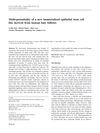 3 citations,
December 2022 in “Cells”
3 citations,
December 2022 in “Cells” Cannabinoids like CBD and THC may help treat non-cancer skin diseases, but more research is needed.
1 citations,
May 2017 in “InTech eBooks” New treatments focusing on immune pathways show promise for stubborn hair loss.
April 2024 in “International journal of molecular sciences” Alopecia areata and vitiligo share immune system dysfunction but differ in specific immune responses and affected areas.
[object Object]  38 citations,
January 2019 in “International Journal of Women's Dermatology”
38 citations,
January 2019 in “International Journal of Women's Dermatology” The document concluded that more research is needed to find the best treatment for Frontal fibrosing alopecia.
32 citations,
May 2018 in “Journal of the American Academy of Dermatology” Skin reactions from cancer treatments might predict how well the treatments work.
2 citations,
December 2023 in “Pharmaceutics” Inhaling medicine may reduce side effects and improve treatment for a major lung cancer type.
 144 citations,
November 2020 in “Frontiers in immunology”
144 citations,
November 2020 in “Frontiers in immunology” Targeting the IL-23/IL-17 pathway effectively treats several inflammatory skin diseases.
143 citations,
January 2004 in “Journal of Investigative Dermatology Symposium Proceedings” Alopecia areata is an autoimmune disease causing hair loss, treatable with immune-modulating drugs, and linked to genetics.
 1 citations,
March 2011 in “Journal of Investigative Dermatology”
1 citations,
March 2011 in “Journal of Investigative Dermatology” Blocking RANK signaling might help treat metastatic melanoma, but more research is needed.
 58 citations,
March 2020 in “Scientific Reports”
58 citations,
March 2020 in “Scientific Reports” EGFR-TKIs can cause significant skin, nail, and organ side effects.
10 citations,
January 2021 in “Annals of dermatology/Annals of Dermatology” Nivolumab can cause hair loss as a rare side effect.
 29 citations,
April 2019 in “Acta neuropathologica communications”
29 citations,
April 2019 in “Acta neuropathologica communications” Stopping mitochondrial respiration can prevent brain cancer spread in skin cancer patients, and plant compound β-sitosterol could help achieve this.
 59 citations,
March 2013 in “European Journal of Obstetrics & Gynecology and Reproductive Biology”
59 citations,
March 2013 in “European Journal of Obstetrics & Gynecology and Reproductive Biology” People with polycystic ovary syndrome have a higher chance of having chronic thyroiditis.
 34 citations,
January 2018 in “International Journal of Dermatology”
34 citations,
January 2018 in “International Journal of Dermatology” Scalp cooling is the most effective FDA-approved method to prevent chemotherapy-induced hair loss, but more research is needed for other treatments.

Chemotherapy can cause skin issues and hair loss, and this guide explains how to manage them.
 16 citations,
January 2015 in “Current problems in dermatology”
16 citations,
January 2015 in “Current problems in dermatology” Alopecia Areata is an autoimmune hair loss condition that needs more research for better treatments.
 290 citations,
December 2017 in “Journal of The American Academy of Dermatology”
290 citations,
December 2017 in “Journal of The American Academy of Dermatology” Alopecia areata is an autoimmune condition causing hair loss, influenced by genetics, stress, and diet, and may be prevented by a high soy oil diet.
23 citations,
January 2016 in “Frontiers in immunology” Using low-dose IL-2 to increase regulatory T cells might be a safe way to treat type 1 diabetes without severe side effects.
[object Object]  12 citations,
May 2017 in “Pharmacology & therapeutics”
12 citations,
May 2017 in “Pharmacology & therapeutics” Targeting immune tolerance issues in Alopecia Areata could restore hair growth and maintain remission.
 5 citations,
February 2008 in “Experimental Dermatology”
5 citations,
February 2008 in “Experimental Dermatology” Cyclosporin A promotes hair growth in mice and increases a protein linked to hair growth, but it may not work the same way in humans.
 34 citations,
June 2008 in “In vitro cellular & developmental biology. Animal”
34 citations,
June 2008 in “In vitro cellular & developmental biology. Animal” Scientists created a long-lasting stem cell line from human hair that can turn into different skin and hair cell types.
 July 2008 in “Biomedical Imaging and Intervention Journal”
July 2008 in “Biomedical Imaging and Intervention Journal” New cancer treatments are more precise and less toxic, improving survival rates, but Asia faces challenges in adopting these advancements.
278 citations,
May 2013 in “Ca” Targeted anticancer therapies can cause severe side effects similar to traditional chemotherapy, but with different types.
 25 citations,
May 2018 in “Clinical & Translational Oncology”
25 citations,
May 2018 in “Clinical & Translational Oncology” New melanoma treatments can cause skin side effects, including skin cancer and rashes, but combining treatments may reduce these risks.
 1 citations,
October 2023 in “Life science alliance”
1 citations,
October 2023 in “Life science alliance” Pantethine may boost the immune system's ability to fight sarcoma.
 42 citations,
January 2021 in “Journal of Clinical Medicine”
42 citations,
January 2021 in “Journal of Clinical Medicine” Microneedle arrays with nanotechnology show promise for painless drug delivery through the skin but need more research on safety and effectiveness.
 2 citations,
October 2015 in “Human Gene Therapy”
2 citations,
October 2015 in “Human Gene Therapy” The congress highlighted new gene therapy techniques and cell transplantation methods for treating diseases.
 1 citations,
January 2010 in “Elsevier eBooks”
1 citations,
January 2010 in “Elsevier eBooks” Any drug can cause skin reactions, but antibiotics, NSAIDs, and psychotropic drugs are more common, with some reactions being life-threatening.
 June 2024 in “Research Square (Research Square)”
June 2024 in “Research Square (Research Square)” Jagged-1 in skin Tregs is crucial for timely wound healing by recruiting specific immune cells.
 1 citations,
December 2022 in “Frontiers in Immunology”
1 citations,
December 2022 in “Frontiers in Immunology” Tissue environment greatly affects the unique epigenetic makeup of regulatory T cells, which could impact autoimmune disease treatment.






















